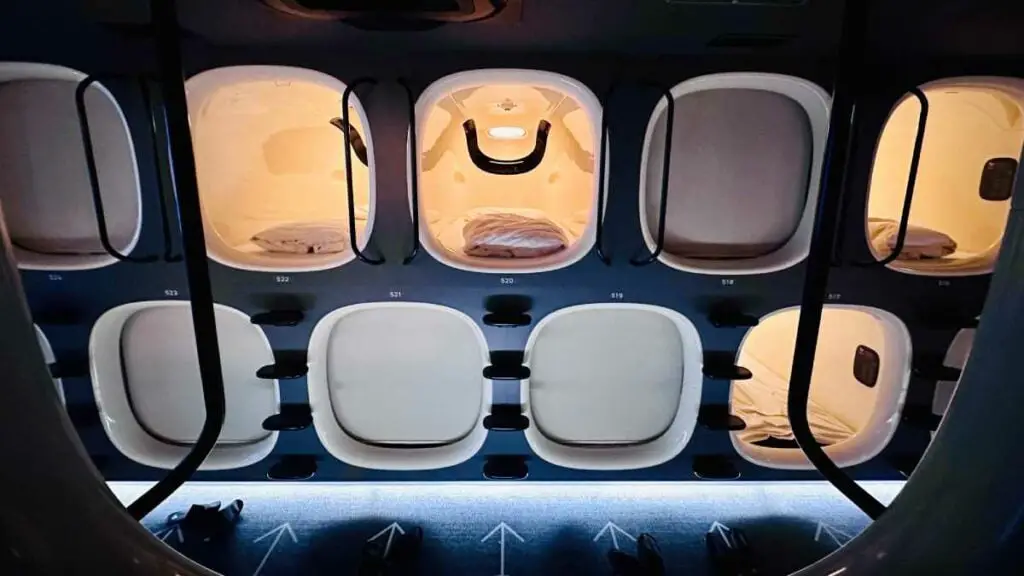When traveling to Japan, you might feel a little surprised with all the differences between Japanese society and your own. Once you land, you will have the feeling of being in another world and it’s perfectly normal. The best thing about traveling to Japan is having the opportunity to see a whole different country with some rules that you didn’t expect at all. To help you with your first time in Japan, I wrote this list of some implicit Japanese rules.
So what are the most common do’s and don’ts in Japan?
If you are curious about this subject, keep reading, and you’ll find some interesting facts that might surprise you.
Be careful when showing affection in public

The Japanese people are not very comfortable with physical touch, especially seniors. When visiting Japan, consider that if you don’t want to get some weird looks. Avoid kissing and hugging your partner, and you might want to avoid holding hands too. Hold on to your partner’s arm instead because it feels much more natural to the eyes of the Japanese. If you’re not sure of what could be acceptable or not, just avoid all physical contact until you’re both alone in your hotel room for example.
Don’t blow your nose in public
If you need to blow your nose in Japan, you must be careful. Blowing your nose in public is not acceptable, and you will never see a Japanese blowing his or her nose in public. Instead, you have to go to the restroom if you want to blow your nose.
While searching for a place where you can blow your nose in private, it is perfectly acceptable to sniffle in Japan. If you ever get annoyed with all the sniffling on the train, just remember that the Japanese are just trying to be polite.
More information about this in my post Why Don’t Japanese Blow Their Nose?
Hey, check out these recommendations I have for you!
Before going any further, take a look at some of the recommendations I've handpicked for you. I think these are essential items you should have on your trip to Japan. You can check them out and buy them directly from Amazon.
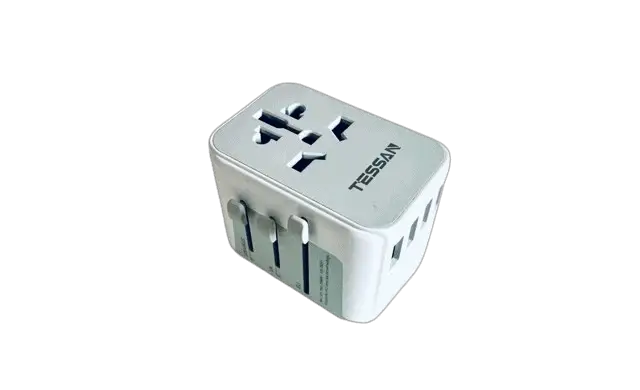
|

|

|
| A universal travel adapter | A 10,000 mAh power bank | A travel adapter and converter |
Wear a mask when you’re sick
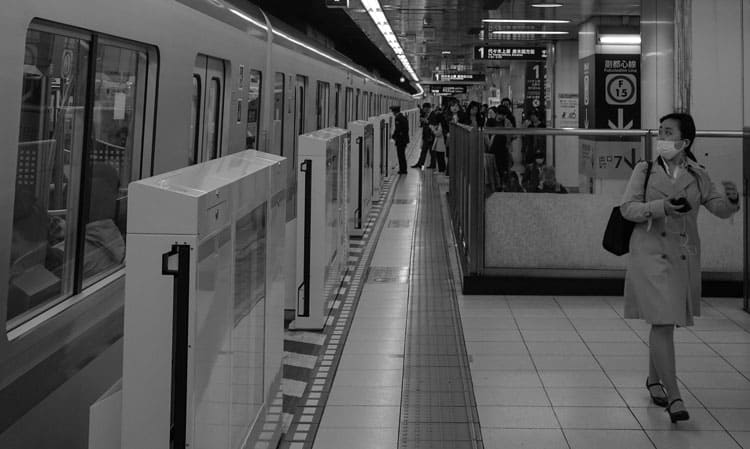
Did you ever wonder why you see lots of Japanese people wearing a mask? Believe me, it is not because they’re maniacs about viruses and afraid of catching diseases. The Japanese are very respectful of others and if they are sick, they immediately start wearing a mask to avoid passing their virus to others.
For Western society, it might seem a little weird (even if this is slowly starting to change due to the coronavirus), but in Japan, it is perfectly normal to wear masks in public. So, if you ever get sick while in Japan, try to be respectful of others and wear a mask too. Our Japanese friends will appreciate it, and you can find original masks everywhere now. If you’re looking for some kawaii designs, you can take a look at our masks sold at Redbubble.
Don’t walk and smoke at the same time
If you’re a smoker traveling to Japan, you should pay attention to the following rule. In Japan, it is considered dangerous to walk and smoke at the same time because you can bump into someone and burn them with your cigarette. More than just a manner, it is a rule in Japan and if you don’t respect it, you will have to pay a fine.
In the streets, look for designated smoking areas and use them. Make sure you don’t smoke outside these areas because the police is always controlling the streets. Therefore, there’s a huge chance you’ll get caught if you don’t follow the rules.
If you need information about vaping, you can read my other article on the subject.
Don’t litter in Japan
Japan is one of the cleanest countries you’ll ever see in your whole life and still, there aren’t many trash cans where you can dispose of your garbage. As usual, Japanese society is based on the respect of others so people don’t litter anywhere like you probably have seen in other countries.
During your trip to Japan, keep this in mind and make sure you carry a plastic bag with you at all times. This can be extremely useful if you don’t find a trash can (and that’s going to happen a lot). If want a cool system, you can buy a small bag dispenser on Amazon that you can clip to your backpack. Also, keep in mind that the trash cans you’ll find right next to vending machines in Japan are meant for the trash from the vending machines items, so avoid putting your garbage in there.
Don’t stare at people

The Japanese people are very shy and introverted, and they don’t feel comfortable when someone is staring. I mean, even in your own country, it is probably a little rude to stare, but for the Japanese, it is even worse.
While in Japan, you will be surprised by lots of different things and costumes that you are not used to, but that’s not a valid reason to stare at our Japanese fellows. Just make sure to respect them while visiting their country.
Don’t shake hands (bow instead)
As you probably know, the Japanese don’t greet like in Western society. To correct way to greet in Japan is to use the bow, but not any bow (that would be too easy). To make it simple, there are 3 different types of bows:
- Light bow
- Medium bow
- Deep bow
The deep bow was used a lot during the feudal period, but it is extremely rare nowadays. Only elderly people use it when greeting the emperor.
Get all the cool spots and tips for a fun trip to Japan. It's free!
Get My Japan Guide
The medium bow is considered the formal bow and you need to bend to 45 degrees. The respect is proportional to the time spent bowing, the longer you keep this position the more respect you pay to the person. As a general rule, you should keep a formal bow for 2 or 3 seconds.
The light bow is the most common of all. You usually bend to around 20 degrees and you keep the bow for 1 second or so.
In any bow, the hands should be kept down at the sides.
Don’t point with your finger
As a general rule, the Japanese don’t point with their finger because it is considered rude. Instead, they gently point with an open hand to what they want to show you. So if you ask for directions to a Japanese, please keep in mind not to use your finger, and don’t be surprised if you see an open hand directed to where you should go.
Don’t be late

The Japanese people are extremely punctual, and they never show up late. If they do, it is probably because of an emergency, a real one. I’ve never seen a society where punctuality was so important like in Japan.
When you think of all the millions of people who rush all day in Tokyo while using public transportation, you could think that being late is normal. But not in Japan. Even the Shinkansen (bullet train) is practically never late with an annual average delay of less than 60 seconds!
Bear in mind that if you have to meet someone in Japan, you have to get there before the expected time because if you’re late, even 5 minutes, the other person will start thinking that something terrible happened to you. And if nothing awful happened, the person will feel disrespected because you didn’t show consideration for the appointment you had. As a general rule, arriving 10 minutes earlier is perfectly normal in Japan.
Be aware of elevators’ etiquette
In Japan, even using the elevator has some basic rules instead of just entering and pushing the right floor button for you. You must know that when you enter an elevator, it is the person that is closest to the buttons that is supposed to push them for all the other persons inside.
Also, if you’re in front of the doors, you are supposed to leave the elevator to let the others out even if it is not your floor, and then get back again. The same thing is valid for public transportation too and almost everywhere when the places are crowded.
It is just a little of common sense and thinking of others first. You must not let our Japanese fellows squeeze through a wave of tourists to continue their way, instead, step aside and let them pass. Remember, Japanese are never late so it can be really annoying to have a tourist that blocks the way.
Always queue in line
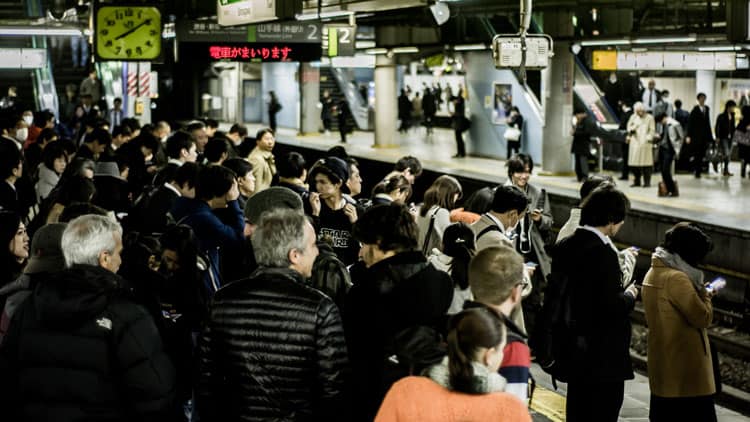
When you know that Japan has around 126 million people, you could expect that people would rush like crazy into trains as soon as they open the doors. Once again, not in Japan. Organization is the watchword that makes the whole transportation system work well and when a train arrives, even if there are thousands of people waiting, it all goes smoothly.
So, when you’re visiting Japan, follow the lead of our Japanese friends and queue in line. Believe me, even if the queue is extremely long, it will be incredibly fast compared to the Western countries because it is all well-organized (and also because the Japanese don’t want to be late anyway).
Don’t make calls while using public transportation
Making phone calls in trains, buses or any other kind of public transportation is a big no-no. Does this mean that the Japanese don’t use their phones? Of course not! You will see them using their phones everywhere but quietly. They will be texting, looking at social media, etc, but no phone calls because that will disturb others, and you already know that the Japanese respect others above all.
So when you get in trains put your phone in silence mode and make sure you respect the calm that reigns in the place.
Take off your backpack while on the train
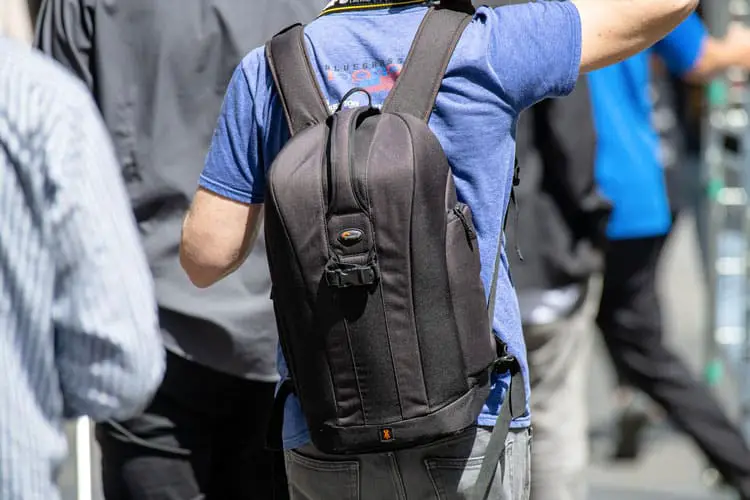
Wearing a backpack in public transportation can be a little tricky, especially if it concerns the one you use for your trip. Therefore, you are expected to put down your backpack and hold it in your hands. Remember that the Japanese use public transportation every day and having a backpack on your back can be really annoying for everyone around you, particularly in a crowded train. Since this is a recurrent problem, the Japanese now have signs to make tourists understand the importance of this simple rule for the well-being of others.
Be quiet
Public transportation is where the Japanese take some time to rest after work so you should be quiet on trains, buses, etc. We’ve seen that you should put your phone in silent mode, but you should also avoid any other kind of noise that can disturb others.
Don’t walk and eat (or drink)
As a general rule of thumb, walking and doing other things at the same time is not accepted in Japan. We already saw that walking and smoking at the same time is forbidden by law, but eating and drinking while you walk is also a big no-no in Japan. Imagine that you bump into someone with your food full of sauce and you stain his or her clothes, this could be a big problem particularly when people are rushing to get on time.
If you buy some street food, keep in mind to eat it while standing still near that place or to take it back with you to your hotel for example. You should never eat and walk unless you want to draw attention to yourself. The same thing is valid for drinking and walking.
Use chopsticks correctly
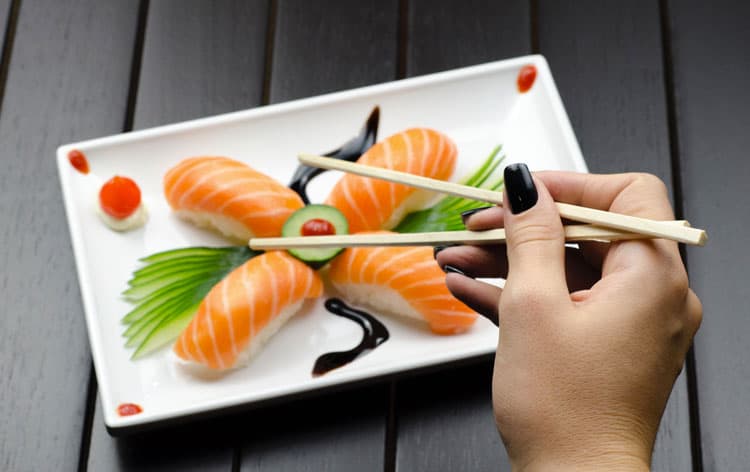
Using chopsticks is naturally tricky, but there are also a few rules to know if you don’t want to get some weird looks from our Japanese friends.
First, remember that you should never pass food from chopstick to chopstick. This is not accepted in Japan because it is related to funeral rituals so you better avoid that. The same happens if you stick your chopsticks vertically into your rice. Don’t do that.
Another thing you should avoid at all costs is to stab food with your chopstick, even if food is a little far away from you and it would be very convenient to stab and get it.
So if you don’t want to offend the Japanese people, avoid at least passing food from chopstick to chopstick, stabbing food with your chopstick, or sticking your chopstick into your bowl of rice. You can start practicing at home right away if you have a pair of chopsticks, and if you don’t have one already, there are several models available on Amazon like these natural wood chopsticks.
I also wrote a full article about chopsticks if you need more detailed information.
Don’t pour the drink into your own glass

In Japan, drinking is a common social activity and, as any social activity in Japan, it has its own rules. If you’re drinking with other people (especially with Japanese friends), you must not pour the drink into your own glass. Japanese manners say that you should pour the drink into everyone’s glass, but not yours. Instead, put down the bottle and wait for your Japanese friend to pour the drink for you. When he or she pours the drink, you should grab your glass with both hands and thank him/her.
Insider tips for your Japan trip. Quick, easy, and free!
I Want This
If you forget this rule, you will receive some surprised looks towards you.
Cheer before drinking

You probably have seen this in Japanese movies or dramas without even knowing that is a big rule in Japanese manners regarding drinking. If you drink with someone you must always cheer before drinking. The Japanese word for cheers is kanpai so try to remember it and use it on your next drinking party in Japan. If you forget to do this before drinking, you will be disrespectful and considered selfish. As a general rule, the Japanese order the same drink for the first round.
Use polite words when eating
If you have seen some videos about food in Japan, you probably noticed that people always say the same thing before eating. It is the word itadakimasu (いただきます) and that can be roughly translated to “I receive”. Itadakimasu is a polite word to express gratitude towards the person who prepared it. Also, at the end, you are expected to say goshisousamadesu (ごちそうさまです) which is also a polite expression to express your gratitude again. It can be translated to “it was a fest”.
Don’t dip the rice in the sauce
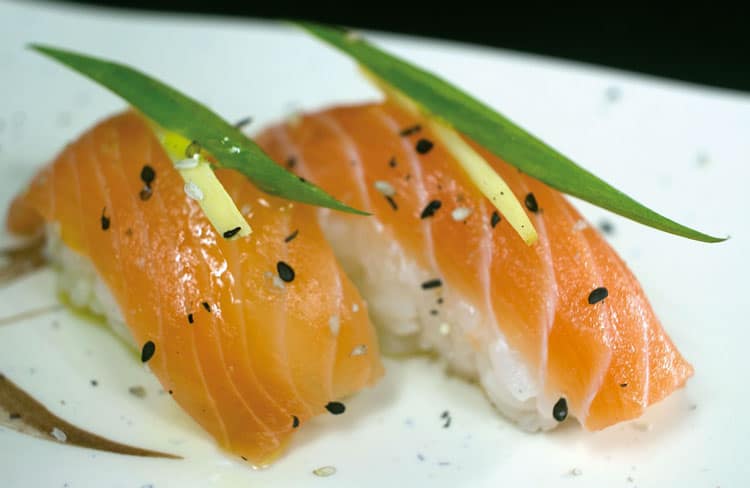
You will probably want to try the true Japanese sushi once in Japan and you’re right because there’s nothing better than traditional sushi. Yet, be careful with the sauce and a type of sushi called Nigiri because there’s also a big no-no while using both. If you try the nigiri sushi, you should never dip the rice into the sauce. Instead, you should dip it upside down and make sure that only the fish touches the sauce. Having parts of rice floating in the sauce is not well seen in Japan so try to keep that in mind.
Don’t tip
When you get to Japan, it is a good idea to forget your Western good manners because the truth is that they probably don’t match the Japanese society. Tipping can be very common in your country, but in Japan, you should never do it. The Japanese don’t like tipping, and they can’t even understand why would you do that. In Japan, working hard and doing a good job is their daily life. For the Japanese, is completely normal to offer the best service possible to a customer so, if you try to pay more for a job that they are already paid for, they will be confused and won’t understand your gesture, or worse, they can consider that as an insult.
Don’t use the refresh towel on your face (Oshibori)
When you go to the restaurant, you will probably receive a refreshing towel called oshibori. This towel is meant to be used on your hands and not on your face. You will probably see some unconscious tourists using the towel on their faces but don’t be one of them and apply the Japanese manners.
Take off your shoes in Japanese homes

Removing your shoes is not negotiable in Japan, especially in some places like Japanese homes, temples and/or shrines, onsen, and even some traditional restaurants. As a general rule, whenever you see some shelves with footwear by the door, it means that you are meant to remove your shoes. Some places will provide you with slippers to wear inside, but not every single time, so if you’re not comfortable with your socks, I recommend buying new ones before getting to Japan because you will be showing them a lot. 😉
If you want to expand on this subject, you can check my other post “The real reason why Japanese don’t wear shoes inside“.
Respect the Onsen (hot spring) etiquette
In Japan, the bath is not seen as a way of cleaning, but it is more a way of relaxing. This is why you should never enter a bath without having washed yourself. You are supposed to wash yourself completely outside the bath, and once you’re done, you can then enter the bath and enjoy a relaxing experience.
This rule applies to any kind of bath and especially to public baths or onsen. If you don’t know how to use an onsen in Japan, I already wrote an article on that if you want to read it.
Wear the Yukata or Kimono correctly
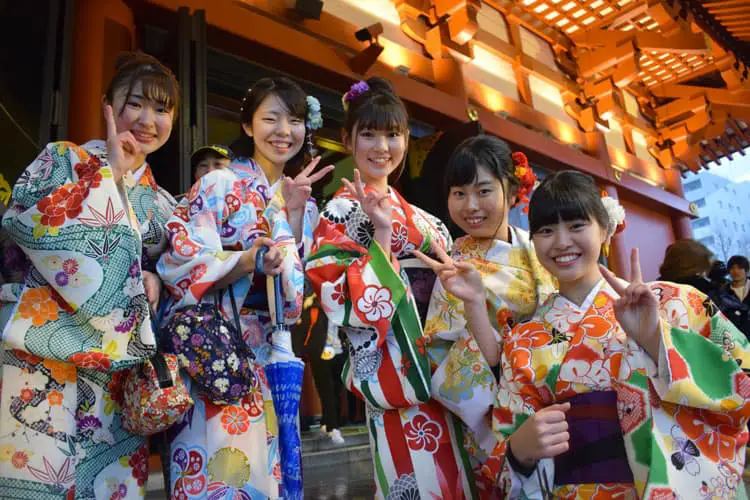
While in Japan, you might be tempted to try a kimono or yukata but be aware that there are essential rules you must respect. The most important one is to always wrap the left side over the right side because the other way around (the right side over the left side) is only used to dress the dead. So, if you don’t want to get the Japanese weird look, try to keep this in mind at all times.
Use toilet slippers only in the restroom
Yes, in Japan people don’t enter the restroom with their shoes, instead, they use toilet slippers. This might seem a little strange for foreigners and tourists, but it is a very simple daily rule in Japan. As we saw before, since you are supposed to remove your shoes when you enter the house, etc, you might think that it’s going to be easy to apply this rule, yet life has shown us that foreigners have problems applying it. The toilet slippers are meant just for the restroom, but it’s not rare to see tourists getting out of the toilet with the slippers on. Please avoid doing so. Even if the Japanese are now used to this, it is better to leave the slippers where they are meant to be. 🙂
Cover your umbrella when needed

If you have done some research about Japan, you probably know that there is a rainy season and you’re going to get wet if you travel during that period. This is one of the reasons why umbrellas are so common in Japan and therefore there’s a rule that applies to umbrellas.
Instead of carrying your wet umbrella with you everywhere, you should use a plastic cover (a sort of plastic sleeve) and put your umbrella inside it. Imagine how annoying it can get if everyone has his or her wet umbrella on a crowded train. In restaurants or stores, you will see that there is a place to put your umbrella (generally at the entrance) or they will provide you with one of these plastic covers if you don’t have one. If they do, you will have to use it because this is not an option. This prevents you from spreading water drops everywhere, making the floor wet and slippery, which will inevitably annoy other people.
If you prefer to avoid the rainy season, check out my previous article about the Japan weather and the best time to visit Japan.
Last Piece of Advice
I guess this might seem like a long list of things to remember while you’re in Japan, but remember that most of them are common sense and if you just keep in mind to be respectful at any time, you will do fine. Also, the Japanese are used to tourists (especially in big cities) and they will be patient with you if you make some mistakes. And if you feel completely lost with all the Japanese manners, just look around you and follow what other Japanese do.
Good luck 🙂



